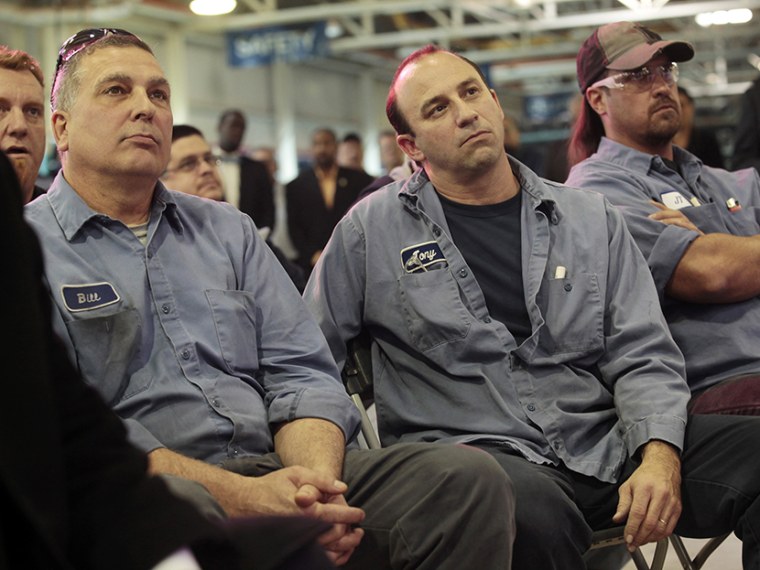The federal government poured $85 billion to prop up General Motors and Chrysler--an infusion of taxpayer money that helped pull America's auto giants back from the brink.
GM posted record profits in 2011, and Chrysler's renewed financial health has helped it open new plants and training centers. Meanwhile, auto sales are projected to top 16 million this year, returning to pre-recession levels. "We refused to let Detroit go bankrupt," President Obama declared last year.
And yet, this week Detroit declared bankruptcy.
Why is the Motor City still in so much trouble?
Despite the shorthand that we still use, Detroit's moniker is a historic relic. The region was the birthplace of U.S. auto manufacturing, but its heyday is long since gone: since the 1970s and 80s, the industry has both downsized and shifted to other parts of the country. In 1975, there were some 100,000 jobs in the surrounding Wayne County; now there are only a quarter of those jobs left--and only about 10,000 jobs are in Detroit city. Despite the lingering nostalgia for the Motor City of old, the two Detroits are no longer interchangeable--and they haven't been for a long time.
"If there's a center of the gravity for the industry, it's probably Nashville, Tennessee," said Mark Zandi, chief economist at Moody's Analytics.
The city's economic health is still tied to the fate of the US auto industry, but that's largely because there are so few other opportunities in a city that's been in decline for decades. The 2009 bailout helped save the few outposts of the industry that remain in the city--two manufacturing plants and General Motors' world headquarters. "If there wasn't any bailout, those three institutions would be gone--about 5,000 assembly jobs and about 2,300 headquarters jobs," said Sean McAlinden, chief economist at the Center for Automotive Research.
Altogether, the total job loss in Detroit city would have been about 30,000 if the car giants failed, McAlinden adds, including the secondary businesses that rely on the auto industry. "The bailout helped the city sidestep a potential employment and tax disaster, " concludes Matt Fabian, managing director of Municipal Market Advisors. "Detroit might have needed to file bankruptcy two years ago rather than now."
But while the auto bailout helped forestall Detroit's demise, it wasn't enough to remedy the city's serious fiscal problems: the city never developed any real alternatives to create jobs aside from the auto industry, prompting residents to flee as opportunities disappeared and eroding the city's revenue base.
Even those who hold Detroit's few remaining auto jobs largely live in the suburbs, given the deteriorating quality of life, which has only accelerated the city's decline. "They aren't paying property taxes and they don't shop in Detroit. You can't force people to live there as a result of the bailout," said McAlinden, who adds that the city government also fell short in adapting to Detroit's Brave New World.
What would an actual bailout of Detroit city look like? Basically, the state or even the federal government could take steps to shore up the city's revenue base and spur job creation to stop the bleeding. The government could relocate public jobs to Detroit to anchor development, for instance, or redirect part of the sales tax to the city's coffers, says Fabian. "The state needs to step up and ensure that Detroit doesn't lose business and growth it already has right now -- to reassure companies there now that things won't get any worse."
But the prevailing perception that the government has already "bailed out Detroit" may make that an even harder political sell.
